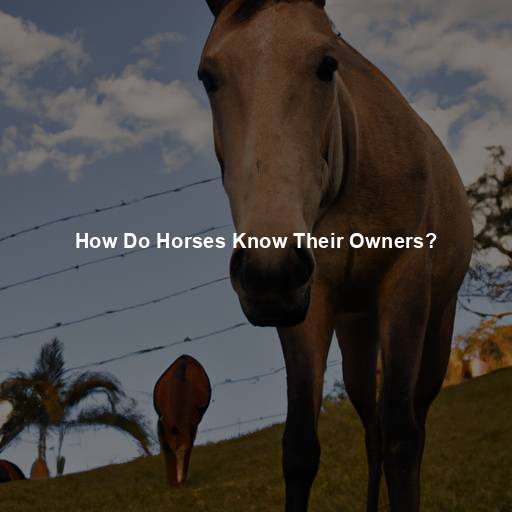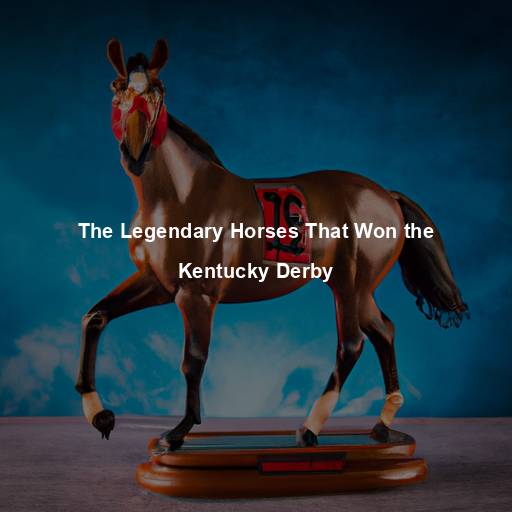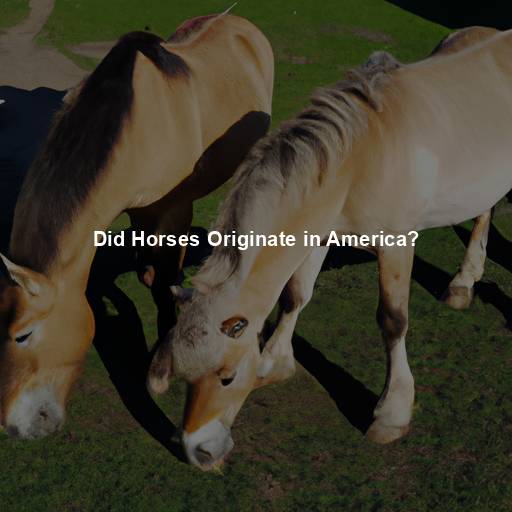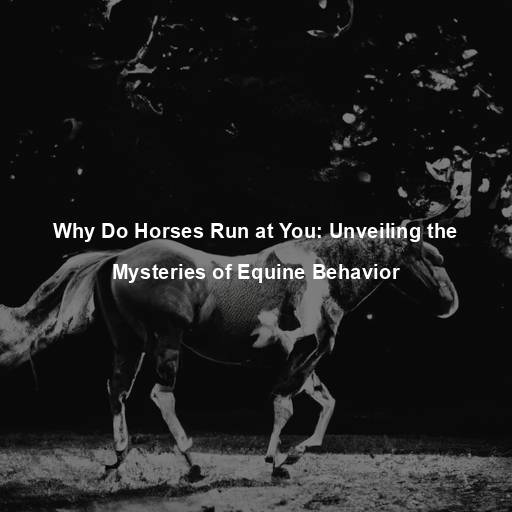How Do Horses Know Their Owners?
Last Updated on November 12, 2023 by Evan
Contents [hide]
- 1 Understanding the Deep Connection Between Horses and Their Owners
- 1.1 The Power of Equine Perception
- 1.2 The Role of Scent
- 1.3 The Power of Voice
- 1.4 Visual Recognition
- 1.5 Energy and Emotional Bonding
- 1.6 Consistency and Routine
- 1.7 Positive Reinforcement and Training
- 1.8 Time, Patience, and Mutual Respect
- 1.9 The Power of Unspoken Communication
- 1.10 Understanding Equine Instincts
- 1.11 The Influence of Early Socialization
- 1.12 The Power of Mutual Understanding
- 1.13 The Impact of Positive Experiences
- 1.14 The Role of Routine and Consistency
- 1.15 The Importance of Body Language
- 1.16 The Influence of Positive Reinforcement Training
- 1.17 The Power of Trust and Respect
- 1.18 The Role of Emotional Well-being
- 1.19 Embracing the Journey
- 1.20 Understanding Equine Communication
- 1.21 Building Trust through Groundwork
- 1.22 The Power of Equine Empathy
- 1.23 The Influence of Past Experiences
- 1.24 The Benefits of Mutual Activities
- 1.25 The Evolution of the Horse-Human Connection
- 1.26 Embracing the Journey of Connection
- 2 FAQs: How do horses know their owners?
- 2.1 How do horses recognize their owners?
- 2.2 Can horses recognize their owners from a distance?
- 2.3 Are horses able to remember their owners after a long absence?
- 2.4 Do horses show any specific behaviors to indicate they recognize their owners?
- 2.5 Can horses form strong emotional bonds with their owners?
Understanding the Deep Connection Between Horses and Their Owners
Horses have long been hailed as majestic creatures, captivating the hearts of equestrians and animal enthusiasts alike. Beyond their undeniable beauty and grace, horses often form deep bonds with their human owners. But have you ever wondered how horses develop this remarkable ability to recognize and connect with their caregivers? In this article, we will delve into the intricacies of this unique human-horse relationship and explore the fascinating ways in which horses come to know and trust their owners.
The Power of Equine Perception
Horses possess an extraordinary sense of perception, allowing them to pick up on subtle cues and nuances in their environment. This acute awareness extends to their interactions with humans, enabling them to recognize individuals based on various sensory inputs. From voice tone and scent to body language and energy, horses possess an innate ability to perceive and differentiate between people.
The Role of Scent
Scent plays a significant role in how horses identify their owners. Horses have a highly developed sense of smell, and they can detect and remember different scents associated with specific individuals. When we spend time with horses, our unique scent becomes familiar to them, etching a sensory memory that they can recall even after a considerable period of time.
The Power of Voice
It’s not just our scent that horses pay attention to; they also recognize our voices. The soothing or commanding tones we use when interacting with them leave a lasting impression. Horses can distinguish between familiar voices and respond differently to each. This ability to recognize their owner’s voice provides a sense of comfort and reassurance, strengthening the bond between horse and human.
Visual Recognition
Horses are highly perceptive when it comes to visual cues, and they can quickly identify their owners based on their appearance and body language. They recognize familiar faces and the way their owners move, enabling them to distinguish between different individuals. This visual recognition further solidifies the connection between horses and their owners.
Energy and Emotional Bonding
Beyond the physical aspects, horses are incredibly attuned to the energy and emotions radiated by their owners. These sensitive creatures can pick up on subtle changes in our moods and emotions, responding accordingly. When we approach them with love, kindness, and patience, horses reciprocate with trust and affection. This emotional bonding forms the foundation of the unique relationship between horses and their owners.
Consistency and Routine
Horses are creatures of habit, thriving on consistency and routine. When owners establish a regular schedule for feeding, grooming, and exercise, horses become accustomed to this rhythm and anticipate their owner’s presence. Through repetition and predictability, horses develop a sense of familiarity and security with their owners, knowing that they can rely on them for their daily needs.
Positive Reinforcement and Training
Training and positive reinforcement are vital components of developing a strong bond between horses and their owners. Horses are highly intelligent animals and respond well to consistent, reward-based training methods. Through these training sessions, horses learn to associate their owner’s guidance and commands with positive experiences. This reinforcement solidifies the connection and fosters trust and respect.
Time, Patience, and Mutual Respect
Building a deep connection with a horse takes time, patience, and mutual respect. Horses are incredibly perceptive and can sense the intentions and emotions of their owners. By investing time in their care, spending quality moments together, and treating them with kindness and respect, owners can establish a profound bond built on trust and understanding.
The Power of Unspoken Communication
One of the most remarkable aspects of the human-horse relationship is the ability to communicate without words. Horses are incredibly responsive to nonverbal cues, relying on subtle body language and energy to understand their owners. This unspoken communication creates a profound connection that transcends language barriers and fosters a deep sense of mutual understanding.
In conclusion, the bond between horses and their owners is a remarkable testament to the power of trust, communication, and emotional connection. Through their heightened senses and innate perception, horses develop an uncanny ability to know and recognize their owners. Whether it be through scent, voice, visual cues, or the unspoken language of energy, horses and humans forge a unique and enduring bond that transcends the boundaries of language and species. So, the next time you find yourself wondering how horses know their owners, remember that it is through a symphony of sensory inputs, consistency, training, and most importantly, love, that this extraordinary connection is formed.
Understanding Equine Instincts
Understanding the intricate dynamics that govern the bond between humans and horses requires delving into the realms of instinct and sociality. As herd animals, horses intricately navigate the wild, relying on an intricate web of social connections for survival. Unveiling the enigmatic nature of equine-human relationships, these majestic creatures exhibit an innate yearning for connection, fostering a profound and intimate kinship with their human counterparts. Within this intricate tapestry of emotions, horses and their owners traverse a remarkable journey, where the untamed meets the domestic, and where an inexplicable rapport births an unbreakable bond.
The Influence of Early Socialization
Early socialization plays a crucial role in shaping a horse’s ability to recognize and trust their owner. Foals that have positive interactions with humans from a young age are more likely to form strong bonds and exhibit greater ease in recognizing and responding to their owners later in life. Gentle handling, consistent care, and positive experiences during the early stages of a horse’s life lay the foundation for a lasting and meaningful relationship.
The Power of Mutual Understanding
There’s something truly remarkable about horses – their uncanny ability to grasp the nuances of their surroundings and those who interact with them. As equestrians immerse themselves in the world of these majestic creatures, an intricate bond begins to weave its way through their hearts. This bond ignites an intimate connection, where both horse and rider become attuned to each other’s desires, feelings, and personal limits. It is within this captivating connection that a harmonious symphony of trust blossoms, providing a haven of tranquility and assurance for horses in the presence of their devoted owners.
The Impact of Positive Experiences
The deep connection between horses and their owners thrives on the vibrant tapestry of positive experiences. Delving into activities that horses truly relish, from the tender art of grooming to embarking on invigorating trail rides or even just basking in the warmth of shared quality time, creates an enchanting realm of delight and tranquility. Through these blissful encounters, horses develop a profound sense of acknowledgment and gratitude towards their devoted owners, binding the threads of their alliance even tighter.
The Role of Routine and Consistency
Horses thrive on routine and consistency, and this is especially true when it comes to their relationship with their owners. Establishing a predictable schedule for feeding, exercise, and interaction helps horses feel secure and fosters a sense of trust. By adhering to a consistent routine, owners create a reliable and stable environment that horses can rely on, thereby strengthening the bond and familiarity between them.
The Importance of Body Language
Communication between horses and humans goes beyond verbal cues. Horses are highly attuned to body language and subtle gestures, allowing them to interpret their owner’s intentions and emotions. By developing an awareness of their own body language and learning to read the signals horses provide, owners can enhance their ability to communicate effectively and build a stronger connection based on mutual understanding.
The Influence of Positive Reinforcement Training
Training methods that utilize positive reinforcement can significantly impact the horse-owner relationship. By rewarding desired behaviors and providing clear and consistent cues, owners can establish trust and respect with their horses. Positive reinforcement training helps horses associate their owner’s guidance with positive outcomes, enhancing their recognition and responsiveness to their owner’s presence and commands.
The Power of Trust and Respect
Trust and respect form the cornerstone of any successful relationship, including the bond between horses and their owners. By consistently demonstrating kindness, patience, and empathy, owners can earn their horse’s trust and respect. This foundation of trust allows horses to recognize their owners as reliable and caring individuals, deepening their connection and fostering a sense of loyalty.
The Role of Emotional Well-being
Horses are highly sensitive creatures, capable of picking up on their owner’s emotions and energy. Maintaining a positive emotional state and being mindful of one’s energy when interacting with a horse is crucial. By approaching interactions with calmness, positivity, and genuine affection, owners can create an environment that promotes emotional well-being in both horse and human, further strengthening the bond they share.
Embracing the Journey
The enchanting bond between horses and their owners is an enigmatic and captivating phenomenon that gradually unravels itself. It demands unwavering perseverance, unwavering commitment, and an authentic adoration for these majestic creatures. As equestrians embark on the odyssey of cultivating a rapport with their equine companions, they embark on a transformative expedition of mutual evolution, comprehension, and harmonious escapades that fortify the unbreakable tie binding them together.
In conclusion, the ability of horses to recognize and know their owners stems from a combination of factors, including sensory perception, positive experiences, consistent care, and emotional connection. Through mutual understanding, trust, and respect, horses and their owners forge a bond that transcends words and creates a profound connection based on love, companionship, and shared experiences. So, as you continue to nurture your relationship with your equine companion, remember to cherish the moments, communicate with empathy, and embrace the unique journey of understanding and being understood by these remarkable creatures. ## Cultivating Trust and Connection: Further Insights into the Horse-Human Relationship
Understanding Equine Communication
Horses possess a sophisticated system of communication that relies on a combination of vocalizations, body language, and facial expressions. By familiarizing themselves with the intricacies of equine communication, owners can deepen their understanding of their horse’s needs and emotions, further strengthening the bond between them.
Vocalizations
Horses, although not renowned for their loquaciousness, possess an intriguing repertoire of vocal expressions that facilitate communication. Through a medley of whinnies, nickers, and snorts, these majestic creatures convey their innermost emotions and intentions. Astute owners who possess the discernment to decipher these equine vocal cues can forge an unbreakable bond, cultivating trust and facilitating fluid, meaningful communication.
Body Language
Did you know that horses are actually experts in the language of the body? They have this incredible ability to convey messages through tiny changes in their posture, movements, and even their expressions. It’s absolutely fascinating how they use these subtle cues to let their owners know if they’re feeling relaxed, stressed, uncomfortable, or genuinely interested in something. By developing a keen understanding of equine body language, owners can foster a safe and harmonious environment that deepens the bond with their majestic horses.
Facial Expressions
Horses have expressive faces that reveal much about their emotional state. By observing their eyes, nostrils, ears, and overall facial tension, owners can gain insights into their horse’s mood and well-being. A soft, relaxed expression indicates contentment, while tense facial muscles or widened eyes may indicate anxiety or fear. Interpreting these facial expressions helps owners adjust their approach and interactions to ensure the horse feels understood and respected.
Building Trust through Groundwork
Building a solid foundation in any relationship is paramount, and the same holds true for the dynamic duo of horse and owner. Enter groundwork – a vital stepping stone toward fostering trust, respect, and effective communication. By embracing various exercises on terra firma, equestrians can forge an unbreakable bond with their equine companion, setting the stage for a harmonious partnership that transcends mere riding.
Leading Exercises
Leading exercises involve guiding the horse from the ground using a lead rope. These exercises help establish clear communication and reinforce the owner’s role as a trusted leader. By practicing leading exercises, owners can develop a strong connection with their horse, as well as enhance their ability to navigate various environments together.
Desensitization Training
In the captivating world of equestrian care and training, desensitization takes center stage as a groundbreaking technique that weaves together confidence, trust, and resilience. By gently immersing horses in a carefully curated symphony of new stimuli, the path to harmonious unity emerges. This transformative process not only empowers the majestic creatures to boldly navigate unfamiliar terrains but also strengthens their profound belief in their human companion’s steadfast ability to shield them from harm. Step into this realm of security and connection as we delve into the artistry of desensitization training, where the extraordinary becomes ordinary and perplexity transforms into serenity.
Establishing Boundaries
Establishing clear boundaries is essential in any relationship, including the horse-human dynamic. By setting consistent and fair boundaries during groundwork exercises, owners teach their horses to respect personal space, respond to cues, and engage in safe and respectful behaviors. This establishes a foundation of trust and mutual understanding, promoting a harmonious partnership.
The Power of Equine Empathy
Horses possess a remarkable level of empathy, allowing them to sense and respond to their owner’s emotions. When owners are experiencing stress, sadness, or anxiety, horses often mirror these emotions and seek to provide comfort. This understanding and shared emotional connection deepen the bond between horse and human, creating a relationship built on empathy and mutual support.
The Influence of Past Experiences
The journey of a horse’s life leaves imprints that can shape their connection with humans, for better or worse. These majestic creatures, with their own stories of trauma and neglect, often need an extra dose of time, patience, and empathy from their caretakers. By delving into the depths of a horse’s past, owners hold the key to unlocking the path towards healing, trust, and a profound bond that defies all odds.
The Benefits of Mutual Activities
There’s something undeniably magical about the connection between a horse and its owner. It’s like watching a beautifully choreographed dance, where each move and step strengthens the bond between them. Whether it’s a thrilling trail ride through breathtaking landscapes, the exhilaration of a horse show, or simply enjoying a peaceful moment in a sun-kissed pasture, these shared experiences create a tapestry of memories that weave their way into the very fabric of their relationship. By engaging in activities that bring joy and fulfillment to both horse and owner, the bond between them transforms into an unbreakable thread of trust, love, and companionship.
The Evolution of the Horse-Human Connection
Through countless generations, the intricate bond between humans and horses has undergone a mesmerizing transformation; a metamorphosis that has transcended the realms of practicality and delved into the realms of companionship and unity. Once mere tools of labor, horses have now garnered a respected status as beloved confidants and treasured allies. The elucidation of equine needs and emotions has marvelously blossomed alongside this evolution, painting an enchanting portrait of understanding and empathy. In our contemporary landscape, the horse-human connection stands as a kaleidoscope of wonder, captivating hearts and minds alike, enriching the lives of both horse and owner.
Embracing the Journey of Connection
The captivating and mysterious bond between horses and their owners is a complex tapestry woven with threads of sensory perception, communication, trust, empathy, and shared experiences. Untangling this enigmatic connection requires unwavering dedication, unending patience, and a profound yearning to grasp the essence of these magnificent beings. As owners embark on this transformative odyssey, they embark on a meandering path of enlightenment, where the pursuit of knowledge and personal growth intertwine with the gentle brushstrokes of mutual enrichment.
In conclusion, understanding how horses come to know their owners involves delving into their unique communication methods, establishing trust through groundwork, recognizing the power of empathy, and embracing shared activities. The horse-human connection is a testament to the remarkable interplay between two species, built on mutual understanding, respect, and the profound bond that transcends words. So, as you embark on your own journey with your equine companion, remember to approach it with an open heart, a willingness to learn, and a deep appreciation for the extraordinary connection that awaits.
FAQs: How do horses know their owners?
How do horses recognize their owners?
The bond between horses and their owners is truly extraordinary, as horses possess an incredible knack for recognizing and remembering those who care for them. It’s fascinating to discover that horses rely on a multitude of cues, including the visual, auditory, and olfactory, to establish this special connection. Through observing the way their owners look, move, and even what they wear, horses can identify them easily. Furthermore, horses are highly perceptive to familiar sounds and scents, enabling them to associate their owners with these sensory experiences. Ultimately, the unwavering care, positive interactions, and nurturing relationships contribute significantly to this remarkable ability.
Can horses recognize their owners from a distance?
It’s truly fascinating how horses possess this innate ability to identify their owners from afar. With their impressively acute visual perception, horses have the extraordinary power to discern familiar faces, even when they’re a distance away. The sheer joy and anticipation that fills their hearts manifest through their perked ears, gentle nickering, and heightened alertness whenever they spot their beloved owner drawing near. It’s important to acknowledge, however, that not every horse may display the same level of visual recognition, as factors such as distance, visibility, and the unique personality of each equine individual can contribute to varying responses.
Are horses able to remember their owners after a long absence?
The bond between horses and their owners is a fascinating subject that continues to amaze researchers and enthusiasts alike. It is well known that horses possess an exceptional memory, allowing them to recall their owners even after prolonged periods of separation. However, it is important to note that the extent of this memory can vary greatly from horse to horse. Some equine companions exhibit an almost immediate recognition, effortlessly reconnecting with their owners as if no time has passed at all. On the other hand, a select few may require a bit more time and patience to fully readjust and reestablish that profound bond that once existed. Nevertheless, there are ways to facilitate this process, such as introducing familiar cues and spending quality time together, ultimately aiding horses in rapid remembrance and strengthening the connection they share with their beloved owners.
Do horses show any specific behaviors to indicate they recognize their owners?
Yes, horses can display various behaviors to indicate their recognition of their owners. They may walk or run towards their owner, neigh or whinny in excitement, nuzzle or nudge them, or even perform specific movements that they were trained to do when with their owner. Horses may also become more relaxed and trusting, displaying calm and content behavior when in the presence of their recognized owner. Each horse’s reaction may differ based on their individual personality, past experiences, and the strength of the bond they share with their owner.
Can horses form strong emotional bonds with their owners?
Absolutely! Horses are known for their ability to form deep emotional bonds with their owners. Over time, consistent care, positive interactions, and mutual trust create a strong foundation for such relationships. Horses are social animals, and when they feel safe and supported by their owners, they develop a sense of security and attachment. These emotional bonds often lead to a heightened sense of recognition, loyalty, and cooperation between horses and their owners.







